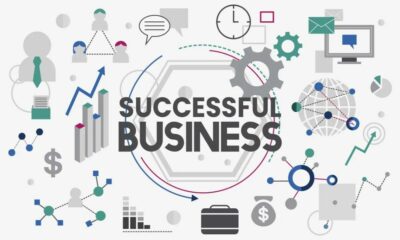Business
Robert Shawn Knight’s Insights on the Entrepreneurial Journey: Lessons in Growth, Resilience, and Success

Starting a business is rarely a straight path. Entrepreneurs often begin with passion and a daring idea, but what unfolds is a journey filled with unexpected pivots and moments of triumph and failure. The early stages demand resilience, adaptability, and a relentless commitment to growth. Success isn’t simply measured by profit, as Robert Shawn Knight explains, but by the impact made, the lessons learned, and the ability to grow with changing markets. Challenges reveal character, and smart decisions shape longevity.
Starting the Entrepreneurial Path
The entrepreneurial journey often begins with a strong desire to solve a problem, pursue independence, or bring a unique idea to life. Many entrepreneurs are driven by a mix of ambition and curiosity, choosing to take the less certain path in hopes of creating something meaningful.
Starting a business means stepping into a world of unpredictability. Entrepreneurs quickly learn that success depends not only on the quality of their ideas but also on their ability to plan, adapt, and stay committed. A small tech startup, say, might begin with a single application idea but grow into a broader digital service as market needs shift.
Long-term vision is essential. Even when the future is unclear, having a clear mission helps guide decisions. Entrepreneurs often rely on this sense of direction when making early choices about partnerships, products, or branding. It becomes the compass during moments of doubt.
Facing Early Obstacles and Learning Quickly
The early stages of entrepreneurship are often riddled with uncertainty. New founders frequently find themselves wearing multiple hats—handling marketing, operations, and customer service—all while trying to build a viable product. Limited resources and lack of experience can slow momentum, but they also create opportunities to learn on the fly. This learning curve, though steep, often sharpens instincts and decision-making speed.
A graphic designer launching a freelance business may quickly discover the challenges of pricing services and managing client expectations. These lessons don’t come from textbooks; they emerge through real-time decisions, some of which will inevitably go wrong. Yet each stumble refines the approach. Over time, these accumulated insights can shape a more structured and confident business strategy.
Adaptability becomes a key survival skill. Entrepreneurs who embrace change and remain open to feedback often gain traction faster. The ability to test ideas, revise strategies, and move forward despite setbacks is what sets long-term players apart from those who burn out early. Those who view change as an opportunity tend to outpace the competition.
Building Resilience Through Setbacks
No entrepreneurial path is free from disappointment. Whether it’s a failed product launch, a lost investor, or a dip in revenue, setbacks are part of the landscape. What matters most is how one responds. Resilient entrepreneurs view failure not as an endpoint but as a valuable phase in the growth cycle. The mindset of treating missteps as stepping stones is what keeps ventures alive.
Take a bakery owner who launches a new menu item that flops. Rather than scrapping the idea entirely, they might rework the recipe, gather customer input, and relaunch with better results. The ability to recover and adapt builds confidence over time. Overcoming these moments also strengthens the team’s trust in leadership.
Maintaining emotional balance through highs and lows is just as important as financial planning. Resilience isn’t about avoiding stress—it’s about confronting it head-on and finding a way forward. Persistence, especially in moments when quitting feels easier, often becomes the defining trait of success.
Making Strategic Decisions
As a business begins to gain traction, growth becomes less about hustle and more about making smart, calculated moves. Entrepreneurs often face tough decisions around hiring, expanding offerings, or entering new markets. Those who scale thoughtfully tend to build stronger foundations than those who chase rapid expansion without structure.
A boutique skincare brand, after gaining initial popularity online, might choose to invest in customer service infrastructure before launching into retail. This kind of prioritization ensures the business can handle increased demand without compromising on quality or brand values.
Listening to customers remains crucial during the growth phase. Trends shift and markets evolve. Founders who stay connected to their audience can pivot more effectively and maintain relevance in competitive landscapes. This feedback loop becomes a vital part of decision-making.
Defining and Measuring Success
Success doesn’t always come with a dollar sign. While profitability is important, many entrepreneurs find fulfillment in impact, freedom, or creative expression. A teacher-turned-app-developer might feel accomplished not because of downloads alone, but because their tool makes education more accessible. Meaning can outweigh metrics when purpose drives the business.
Over time, the definition of success tends to shift. Early on, growth metrics might dominate, but later, work-life balance or team culture might take precedence. Entrepreneurs grow with their ventures, and so do their values. What seemed like the ultimate goal in year one might transform into something deeper by year five.
Staying Adaptable and Informed
The business climate is in constant motion. New technologies, consumer behaviors, and economic shifts demand continuous learning. Entrepreneurs who stay curious and connected—through mentors, podcasts, peer networks, or industry events—tend to outlast those who operate in isolation.
One week, a trend in digital marketing might disrupt how a brand reaches its audience; the next, a regulatory change could reshape product development. Flexibility isn’t optional—it’s a core competency. The most enduring entrepreneurs are those who treat change not as a threat, but as a chance to grow. In this climate, being reactive isn’t enough—proactive learning becomes a competitive edge.
-

 Business3 weeks ago
Business3 weeks agoCorporate Social Responsibility in Action: Amerilodge’s Support of Health and Education Causes
-

 Tech4 weeks ago
Tech4 weeks agoAdobe Releases New AI-powered Video Editing Tools for Premiere and After Effects with Significant Motion Design Updates
-

 Business3 weeks ago
Business3 weeks agoWhere There Is a Will, There Is a Way: Hayson Tasher and the New Year, New Me Mindset in Security Entrepreneurship
-

 Business4 weeks ago
Business4 weeks agoJoesiah Gonzalez’s Perspective On Smarter Fundraising Strategies That Transform Local Nonprofits
-

 Health2 weeks ago
Health2 weeks agoMy Juno Health Enterprise Partnerships Signal Shift From Claims Management to Utilization Prevention
-

 Business2 weeks ago
Business2 weeks agoAlain Khoueiry and His Mission to Present Kazakhstan as a Land of Opportunity and Wonder
-

 Health4 weeks ago
Health4 weeks agoLeg Numbness and Tingling: Vein vs Nerve Causes
-

 Music2 weeks ago
Music2 weeks agoBTS will Return With ‘BTS THE COMEBACK LIVE | ARIRANG’ Concert and New Documentary on Netflix
























